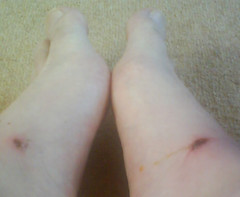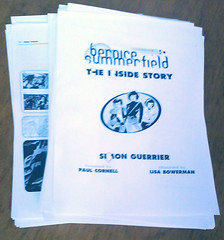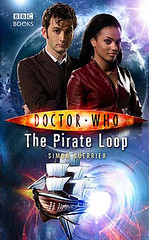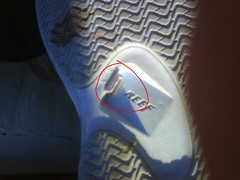“It’s like Allo! Allo!, but without the laughs,” said Monster Maker as he tried to explain to me Secret Army.
“Oh,’ I said. “So just like Allo! Allo!”
Secret Army (1977-79) was one of a number of highly acclaimed BBC telly dramas based on the Second World War. Thought up and produced by the same gang what did
Colditz, this is about the adventures of the Belgian “Lifeline”, a top secret network that rescued crashed Allied airman and got them back to fighting Nazis again. For several wise people I know, it’s the best thing ever on telly.
In the first series, Jan Francis plays Lisa – codename Yvette – the brave young zealot running Lifeline. She works through Brussels café le Candide run by the charming Albert Fourier (Bernard Hepton). Albert’s crippled wife is bed-ridden, but aware that Albert’s carrying on an affair with waitress Monique (Angela Richards). Lifeline also gets help from teenage waitress Natalie (Juliet Hammond-Hill) and vegetable-seller / radio-operator Alain (Ron Pember), plus Doctor Keldermans (Valentine Dyall). There’s also English agents, old ladies and helpful peasants along the way.
It’s a brutal series where nobody is safe, the work of saving some 800 airman taking a terrible toll. As the Germans continually point out, an airman being captured goes becomes a prisoner of war, but anyone helping them escape will be shot. So there’s plenty of chases across roof-tops and through the country, and some occasional firefights and explosions.
Pretty much every actor of the time is in it, plus several young faces yet to be names. Matthew Sweet and I invented a game for watching it, where you get one point for naming an actor, two points for naming something else they’ve been in, and five points for their role in Doctor Who. The Black Guardian’s a regular, and so is
Doctor Skagra, and there’s roles for the Security Chief from The War Games, Griffiths from Attack of the Cybermen and even the boss of the Krillitane.
It’s also odd to see Klinkerhoffen, von Strohm and Gruber from Allo! Allo! in it. But also odder to imagine anyone being sold “Let’s do Secret Army as a sitcom”. Did someone really respond, “Yes, that’s a good idea…”?
Like a lot of old drama (and maybe Casualty now) the pathos comes from watching people dashed on the rocks of ill-fortune. Yes, like Casualty, we can sometimes spot which characters are going to die from the moment they’re introduced. But other characters, like (muto) Stephen Yardley’s Max and (
my friend) Paul Shelley’s Major Bradley, are both sudden and nasty surprises.
Likewise, Yvette is suddenly killed off in the first episode of season two, just as le Candide becomes a posh restaurant and changes the whole dynamic of the series. This means that it can cater for the occupying forces, so there’s more interaction between the goodies and the German villains. These are lead by Clifford Rose’s Kessler, head of the Gestapo, and Michael Culver’s Brandt as the firm-but-fair head of the Luftwaffe. The series also explores the Germans’ relationships, and offers a sympathetic view of the ordinary German soldiery, as separate from the Nazi sadists.
Which is odd, because Andy Priestner’s notes and the DVD extras tell us that Clifford Rose was the one the audience went for. Perhaps that’s because the ladies like a villain, or because even he is made sympathetic through his relationship with Hazel McBride’s Madelaine. She didn’t, though, continue into the dubious-sounding spin-off which sees us rooting for Kessler on the run.
In fact, a hell of a lot of the series is about the complexities of what’s often portrayed elsewhere as a simple war of good versus evil. Lifeline has to make tough decisions and sacrifice people, just to protect themselves, while the Germans are often kind and caring people, just as hurt by the ongoing war. The fact that the series can so ruthlessly, unexpectedly despatch its characters also adds to the sense that we don’t know what’s coming next.
Season Two also sees a lot of stock footage mixed in with the action, tying the events and characters of the drama into the real, historical record. I wondered how much more effective that would have been at the time, so soon after
The World At War.
The second season ends with news of the Allied invasion, and the prospect of liberation. But this in fact causes more complications in Season Three, as it becomes harder to run Lifeline with the roads, trains and phones out of action, and with Terrence Hardiman’s Reinhardt breathing closer down their necks. What’s more, the communists see Albert as the enemy, and the rest of Brussels see him as a conspirator. It becomes a race against time: will Albert and his friends be lynched before the Allies can explain their efforts.
The four episodes leading up to the end (bar the final episode) take place on consecutive days as the Allies get into Brussels. There’s a sudden change of pace and loose ends get tied up very quickly. There are still some last-minute deaths for regular characters, but there’s also a sudden romance and rescue that I hadn’t seen coming at all. Calling the final episode “The Execution” had me thinking it would go a whole other way entirely. Good herring there, fellas!
I’d heard something of the events of the penultimate episode from my parents, who remembered the series fondly. The bit that stuck in their mind was Monique having her head shaved by the Brussels mob, for being an adultress and collaborator. Is it wrong to be disappointed that it’s only an extra who gets the grade 2 treatment? I felt that this rescue and Monique’s subsequent adventures were too contrived a happy ending – even if the final scene of the series plays again into the complexity of everyone’s relationships.
And then suddenly it’s all over. A
never screened, never available final episode is described in the DVD notes, reuniting the characters in 1969, while Albert and Natalie had cameos in the spin-off Kessler. And there are details of a CD of singing on
Andy Priestner’s website.
Is it the best thing ever, then? The structure’s a bit odd in places so that suddenly whole long plot lines are over. Sometimes it’s pretty hysterical (“Plague!!!”), and I’d have liked some more funny bits to balance the general misery. But it’s a gripping, intelligent series full of fantastic characters and detail, and really rather special.
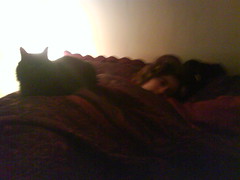 Snot and sore throat since last Tuesday is not the only sign that the nights are drawing in. The air bites briskly on the way into work, and the cat leeches our warmth at night.
Snot and sore throat since last Tuesday is not the only sign that the nights are drawing in. The air bites briskly on the way into work, and the cat leeches our warmth at night.




